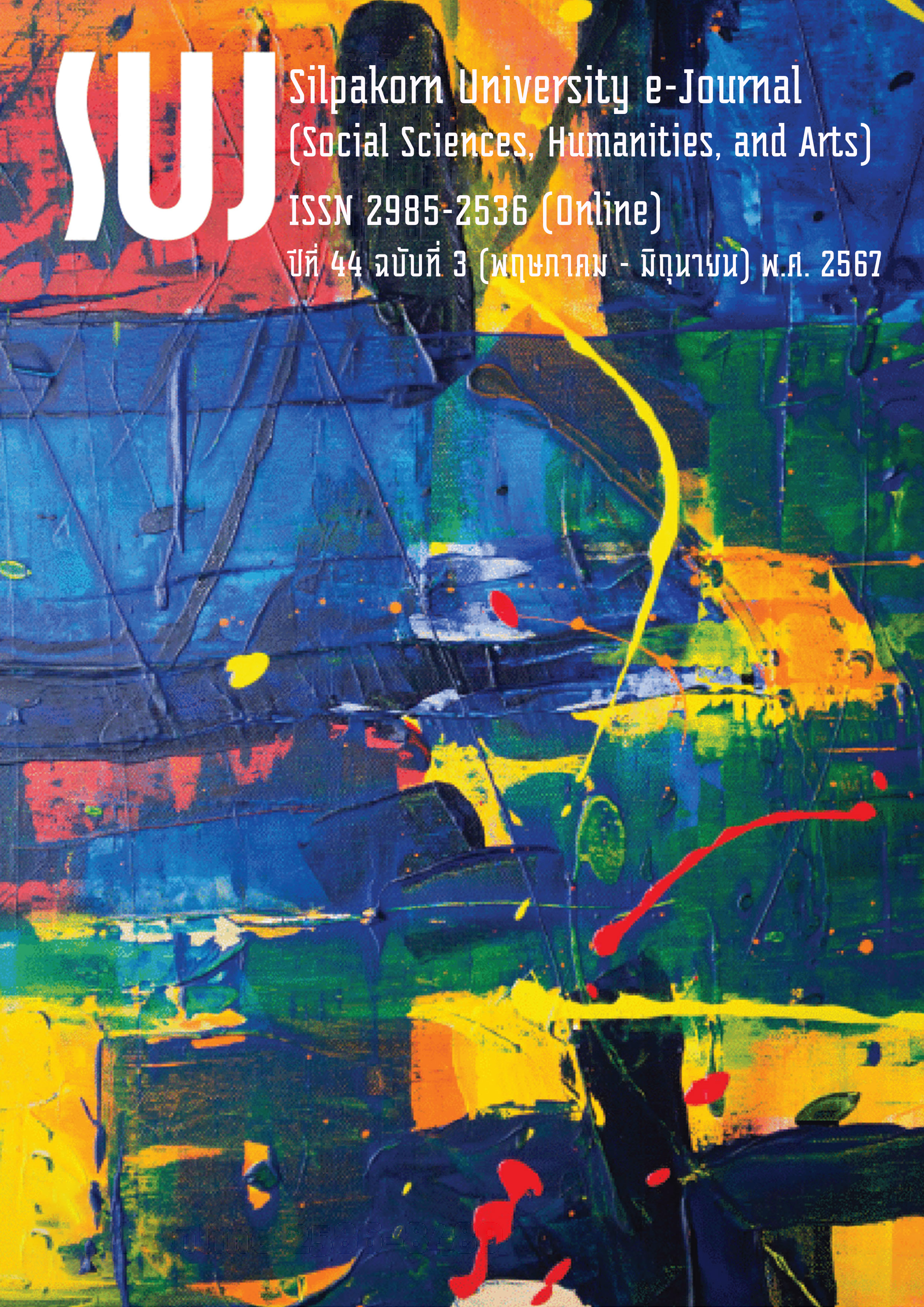ข้อเสนอเชิงนโยบายแบบมีส่วนร่วมการจัดการสถานบันเทิงแบบครบวงจรที่ส่งผลต่อการพัฒนาอุตสาหกรรมการท่องเที่ยวของประเทศไทย (Proposed participatory policy for entertainment complex management impacting the development of Thailand’s tourism industry)
Main Article Content
Abstract
การวิจัยนี้ มีวัตถุประสงค์เพื่อ 1) ศึกษาปัจจัย ปัญหาและอุปสรรคในการจัดทำแผนข้อเสนอเชิงนโยบายแบบมีส่วนร่วม 2) พัฒนาข้อเสนอเชิงนโยบายแบบมีส่วนร่วม และ 3) ประเมินและนำเสนอข้อเสนอเชิงนโยบายแบบมีส่วนร่วม ใช้วิธีวิจัยและพัฒนา แบ่งการวิจัยออกเป็น 4 ขั้นตอน ขั้นตอนแรกเป็นการวิเคราะห์ปัจจัย ปัญหาและอุปสรรค ด้วยวิธีการวิเคราะห์เอกสาร และการสนทนากลุ่ม จำนวน 15 คน ขั้นตอนที่สอง จัดทำร่างข้อเสนอเชิงนโยบายแบบมีส่วนร่วมและสัมภาษณ์ผู้ให้ข้อมูลหลัก จำนวน 7 คน ขั้นตอนที่สาม การนำเสนอข้อเสนอเชิงนโยบายแบบมีส่วนร่วมและทดสอบด้วยการประชาพิจารณ์ จำนวน 110 คน และขั้นตอนสุดท้าย การตรวจสอบและยืนยันด้วยการประชุมสัมมนาอิงผู้เชี่ยวชาญ จำนวน 11 คน เครื่องมือที่ใช้ในการวิจัย คือ แบบสอบถาม แบบสัมภาษณ์ และแบบประเมินเพื่อรับรองข้อเสนอเชิงนโยบายแบบมีส่วนร่วม ผลการวิจัยพบว่า สถานบันเทิงแบบครบวงจรมีจุดแข็ง คือ สามารถสร้างงานและรายได้ให้กับประชาชน พัฒนาเศรษฐกิจของประเทศ และส่งเสริมภาพลักษณ์การท่องเที่ยวที่หลากหลาย แต่ควรระวังปัญหาที่อาจส่งผลกระทบต่อสังคม วัฒนธรรม และสิ่งแวดล้อม การพัฒนาข้อเสนอเชิงนโยบาย มีจำนวน 6 องค์ประกอบ โดยใช้ชื่อว่า TEMPIG ประกอบด้วย 1) การจัดการท่องเที่ยวและเครือข่ายความร่วมมือ 2) การพัฒนาศักยภาพสถานบันเทิงแบบครบวงจร 3) การบริหารจัดการสถานบันเทิงแบบครบวงจร 4) การพัฒนาศักยภาพทรัพยากรมนุษย์และชุมชน 5) การพัฒนาศักยภาพโครงสร้างพื้นฐานและสิ่งอำนวยความสะดวก และ 6) การสนับสนุนจากภาครัฐ สำหรับผลการตรวจสอบและรับรองข้อเสนอเชิงนโยบายด้านความเหมาะสม ความเป็นไปได้ ความสอดคล้อง และความเป็นประโยชน์ พบว่าอยู่ในระดับมาก โดยข้อเสนอเชิงนโยบายการจัดการสถานบันเทิงแบบครบวงจรที่ได้จะสามารถเป็นส่วนหนึ่งของการพัฒนาอุตสาหกรรมการท่องเที่ยวของประเทศไทยเพื่อสร้างรายได้นำมาพัฒนาประเทศในด้านอื่น ๆ ต่อไป
This research aimed to achieve the following objectives: 1) to study the situation, factors, problems, and obstacles in the preparation of participatory policy proposals, 2) to develop a proposed participatory policy, and 3) to evaluate and present the proposed participatory policy. This research utilized a research and development methodology and was divided into four stages. The first stage involved analyzing the factors, problems, and obstacles through document analysis and focus group discussions with a group of 15 experts. In the second stage, a draft of the proposed participatory policy was prepared, and interviews were conducted with 7 key informants. The third stage involved presenting the proposed participatory policy and testing them through public hearings with 110 participants. Finally, the proposals were reviewed and evaluated in connoisseurship meetings with 11 experts. The research instruments were questionnaires, interviews, and assessments used to validate the proposed participatory policy. The research findings revealed that comprehensive entertainment complexes have strengths that can create jobs and generate income for the people, thereby contributing to the country’s economic development and promoting a diverse tourism image. However, there is also an acknowledgement of potential issues that could affect society, culture, and the environment. The development of proposed participatory policy comprises six components under the name TEMPIG, including 1) Tourism management and partnership, 2) Entertainment complex development, 3) Management, 4) Human resource and community development, 5) Infrastructure and amenities development, and 6) Government support. Experts agreed that the proposed participatory policy was appropriate, feasible, compatible, and beneficial at a high level. The resulting comprehensive policy for entertainment complex management will be able to contribute significantly to the development of Thailand’s tourism industry by utilizing the revenue generated for the country’s overall development.
Downloads
Article Details

This work is licensed under a Creative Commons Attribution-NonCommercial-NoDerivatives 4.0 International License.
References
Chandrachit, Kanjana, Suthaluang, Pimpaporn, Kosasawieng, Thanyalak, & Thammasupreede, Supachai. (2022). Has Thai Tourism Recovered? (การท่องเที่ยวไทยฟื้นตัวแล้วหรือยัง?). [Online]. Retrieved September 20, 2022 from http://www.fpojournal.com/thai-tourism-situation/
Chareonwongsak, Kriengsak. (2012). Entertainment Complex: The Questions that the Government Must Answer (Entertainment Complex: คำถามที่รัฐบาลต้องตอบ). [Online]. Retrieved January 7, 2023 from http://drkriengsak.blogspot.com/2012/03/entertainment-complex.html
Choibamroong, Therdchai (Ed.). (2006). Annual of International Thai Tourism Journal: 2006 (รวมบทความวารสารวิชาการ การท่องเที่ยวไทยนานาชาติ: ปี พ.ศ. 2549). Bangkok: Thailand Tourism Development Research Institute.
Department of Children and Youth, Ministry of Social Development and Human Security. (2016). Operation Manual of Preparation of Policy Proposals, Strategies, Plans and Measures for the Protection and Development of Children and Youth (คู่มือการปฏิบัติงาน การจัดทำข้อเสนอเชิงนโยบาย ยุทธศาสตร์ แผน และมาตรการด้านการคุ้มครองและพัฒนาเด็กและเยาวชน). [Online]. Retrieved September 28, 2022 from http://tpso4.m-society.go.th/images/DatabaseTPSO4/About_TPSO/Department-of-children.pdf
Getsuwan, Ruangvit. (2014). Public Policy (นโยบายสาธารณะ) (3rd ed.). Bangkok: Borpit Printing.
Jantanasaro, Ekapol. (2018). The Study of the Attitude of Thai People Towards the Establishment of Casinos in Thailand (การศึกษาสำรวจทัศนคติของคนไทยต่อการก่อตั้งคาสิโนในประเทศไทย). Master’s dissertation, Thammasat University, Bangkok, Thailand.
Khwan-ngern, Suthee. (2016). Principles of Management (หลักการจัดการ). Bangkok: Se-Education.
Nithiprapha, Nattakrit. (2021). Situation Analysis of MSME in the Tourism Business Field in 2021 and Trends in 2022 (บทวิเคราะห์สถานการณ์ MSME สาขาธุรกิจท่องเที่ยว ปี 2564 และแนวโน้มปี 2565). [Online]. Retrieved September 18, 2023 from https://en.sme.go.th/upload/mod_download/download-20211012232619.pdf
Penglee, Sunida, & Sorakraikitikul, Monthon. (2017). The paticipatory development in employees retention plan (การพัฒนาแผนการรักษาพนักงานแบบมีส่วนร่วม). Panyapiwat Journal, 9(1): 59-69.
Phornprapa, Krisada. (2017). Gambling and public opinion in the United States on the full range of entertainment. Casino resort in Thailand (พฤติกรรมการเล่นการพนันและความคิดเห็นของประชาชนในประเทศไทยที่มีต่อสถานบันเทิงครบวงจร รีสอร์ทคาสิโนในประเทศไทย). Veridian E-Journal, Silpakorn University (Humanities, Social Sciences and Arts), 10(2): 266-285.
Rapeepat, Asin. (1984). Community Participation in Rural Development in Thai Social and Cultural Conditions (การมีส่วนร่วมของชุมชนในการพัฒนาชนบทในสภาพสังคมและวัฒนธรรมไทย). Bangkok: Public Health Policy Center, Mahidol University.
Thairat Online. (2022). Announcement of the Council Appointing a Special Committee to Study Entertainment Complex – Legal Casinos (ประกาศสภาฯ ตั้ง กมธ. วิสามัญศึกษาสถานบันเทิงแบบครบวงจร-กาสิโนถูกกฎหมาย). [Online]. Retrieved January 24, 2023 from https://www.thairath.co.th/news/politic/2305797
The Secretariat of The House of Representatives. (2022). Report of the Results on the Study of the Opening of Integrated Entertainment Complex, Collecting Revenue and Taxes from Legal Casino Businesses and Measures to Prevent and Solve Illegal Gambling Problem, the Epidemic of Electronic Gambling Kiosks and Online Gambling (รายงานผลการพิจารณาศึกษาญัตติเรื่อง การศึกษาการเปิดสถานบันเทิงแบบครบวงจร (Entertainment Complex) การจัดเก็บรายได้และภาษีจากธุรกิจกาสิโนถูกกฎหมาย และมาตรการในการป้องกันและแก้ไขปัญหาบ่อนการพนันผิดกฎหมาย การแพร่ระบาดของตู้เกมพนันไฟฟ้าและการพนันออนไลน์). [Online]. Retrieved May 7, 2023 from https://www.parliament.go.th/ewtcommittee/ewt/25motion_entertainment/ewt_dl_link.php?nid=342&filename=index
The Thirteenth National Economic and Social Development Plan (2023-2027) (แผนพัฒนาเศรษฐกิจและสังคมแห่งชาติ ฉบับที่ 13 พ.ศ. 2566-2570). (2022, November 1). Royal Thai Government Gazette (No. 139 Special Chapter 258 d, p. 1). [Online]. Retrieved October 7, 2023 from http://www.ratchakitcha.soc.go.th/DATA/PDF/2565/E/258/T_0001.PDF
Tianam, Nakrob. (2017). Eastern Thai-Cambodian border casino: Impact and management of border communities(บ่อนคาสิโนชายแดนภาคตะวันออกไทย-กัมพูชา: ผลกระทบและการจัดการของชุมชนชายแดน). Romphruek Journal of the Humanities and Social Sciences, 35(2): 163-188.
Tiyao, Sanoh. (2007). Strategy Management (การบริหารกลยุทธ์). Bangkok: Thammasat University.
Wamanond, Wannapa. (2018). Public policy process in Thailand: Problems and solutions (กระบวนการนโยบายสาธารณะในประเทศไทย). Kasem Bundit Journal, 19(March 2018, Special): 197-207.
Wannathanom, Chantouch. (2009). Tourism Industry (อุตสาหกรรมการท่องเที่ยว). Bangkok: Sam Lada.
Wongkiattirat, Wattana, Suwanpakdee, Krissana, Parinyathanakul, Pornpan, Thananikom, Waleeporn, & Nukulwutthiopas, Porntip. (2005). Strategic Planning: The Art of Mapping Organization towards Excellence (การวางแผนกลยุทธ์ : ศิลปะการกำหนดแผนองค์กรสู่ความเป็นเลิศ) (3rd ed.). Bangkok: Innographic.
Wongsakdirin, Wayupak, & Kheovichai, Kanit. (2021). Proposed policy for Chedi-bucha canal area management as the creative tourism attraction of Nakorn Pathom Province (ข้อเสนอเชิงนโยบายการจัดการพื้นที่คลองเจดีย์บูชาให้เป็นแหล่งท่องเที่ยวเชิงสร้างสรรค์ของจังหวัดนครปฐม). Silpakorn Education Research Journal, 13(2): 101-118.


